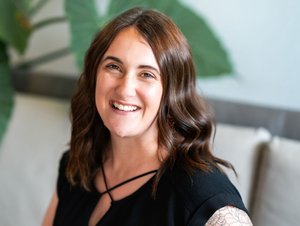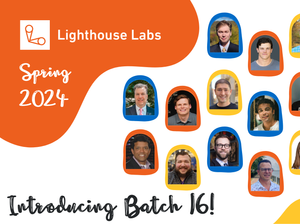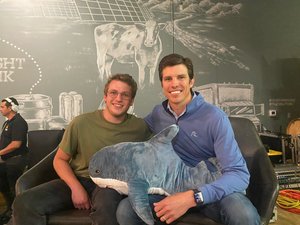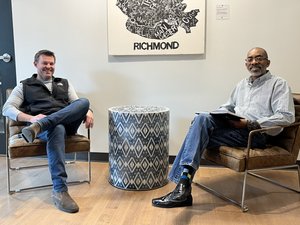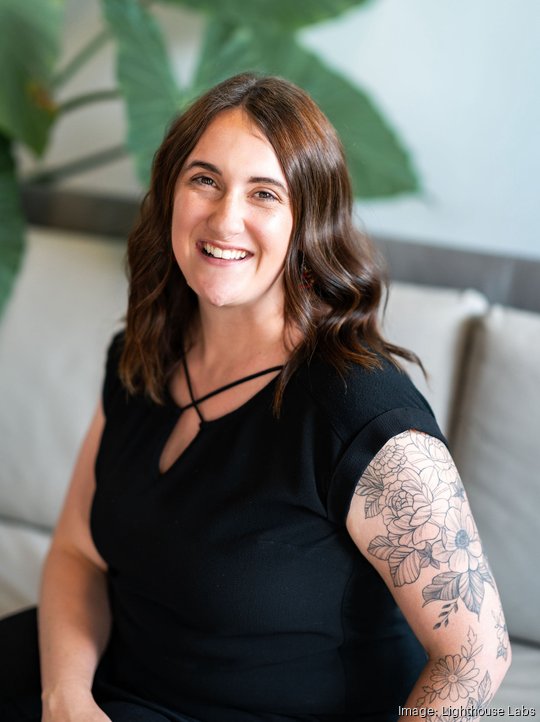
Debbie Irwin took the reins of Lighthouse Labs, a nationally recognized startup accelerator in Richmond, in late February. Just days later, Lighthouse welcomed its new spring cohort of startups — the 16th group to pass through the program. So, you might say Irwin is really learning on the fly.
I recently sat down with Irwin to ask her how her past experiences — most recently as the director of the Shenandoah Community Capital Fund (SCCF) — have prepared her for this role and how she sees the organization expanding and growing in the years ahead.
The following is our conversation edited for space and clarity.
What attracted you to this role? My mentor is Larkin Garbee, who is one of the co-founders, along with Todd Nuckols, of Lighthouse. It’s kind of a full-circle moment for me to get to work with my mentor, who was one of the key stakeholders in creating this company and mentored me while helping SCCF grow, and this awesome group of people who all shared in this dream of creating this company I now get to bring into the next 10 years. I’ve always loved Richmond and have always been attracted to the city. Even though I was born and raised in Lynchburg and went to school at James Madison University in Harrisonburg, I have always found myself constantly visiting and engaging with Richmond and building more relationships here once SCCF got to a point where we were doing a lot of statewide conversations. Personally, it’s exciting to get to Richmond. Professionally, it’s kind of been a path I’ve been on for a while.
How has your background prepared you for your new role with Lighthouse Labs? A lot of my previous experience comes specifically from the nonprofit management side. So, when I took over SCCF in 2018, we were at this point of transition. We had been around for 10 years, and we were excited about the future and deciding where we wanted to go next. I got to go in and say, “Let’s move in this direction.” We really worked with our partners and the board to grow our organization to the next spot. That very much mimics where Lighthouse is at right now. They’ve done this beautiful work over 10 years. They’re looking at their next 10 years and what we want to do next, and so, there’s some really exciting opportunity. It’s really easy to translate that nonprofit management to this nonprofit management. There is a lot in my background that helps specifically in this role and a lot of new aspects of Lighthouse that will challenge me and help me grow in this role as well.
What would you change as far as the operations of Lighthouse? I think, for me, it would be follow-on support. There is a lot in the Richmond ecosystem and beyond that does really a good job of getting the founder ready for acceleration. For some, they won’t need anything else from Lighthouse after the 11 weeks with us, but others might need additional support. I think there is some additional support we can offer once they exit the program. I think more of a focus on the alumni network, continuing in engaging, creating and expanding that network will be key. One of the three biggest things I’ve heard founders say they love about Lighthouse is the community, the amount of mentors and financial investment in these new companies. There’s a certain magic to the community that Lighthouse has already created. Now, we want to see what that looks like if we dig a bit deeper into that and connect these founders to a long-term support system. I think it gives the founders the opportunity to come back and continue to engage with future founders like they have already. I know the accelerator program is strong, but what opportunities do we have after that?
What do you think will be the most challenging part of your new position? Figuring out all the pieces and how they connect. This ecosystem, in particular, has a lot of resources. It is a very vast network. There’s been some good mapping already done about how they all connect, but really solidifying the ecosystem, I think, is a big step. And not just the Richmond ecosystem but Richmond and surrounding areas. A lot of people have viewed Lighthouse as a statewide accelerator, so what does it look like to build in deep partnerships with areas outside of just Richmond — Charlottesville, Danville, Southside, Northern Virginia. We really need to figure out how to make those connections, what does it look like to dig into the ecosystem and figure out who owns what and how can we make it fit together. There are some really great partnerships and collaborations already happening, so what does it look like to continue to tap into that and grow that ecosystem holistically so an entrepreneur is fully supported from idea to exit.
What do the next 10 years at Lighthouse Labs look like? For me, these first 30 to 90 days will be about customer discovery, going back to the roots of entrepreneurship and understanding from the alumni, from the stakeholders and current founders what do they want to. And then, working with the board to take all of that learning and set that vision. I think that there are a lot of ideas out there for where Lighthouse can go next and what it can be, but a big portion of my job in these first few months is to take all of that information and really dial it into the vision. I think, for me, what I would hope for and what I want to drive for is continued growth for Virginia companies and beyond. The way Lighthouse has been able to support founders over these last 10 years across a multitude of industries is very appealing when it comes to the accelerator world, and so, there could be potential for picking specific industries. We could stay industry agnostic. We could look at a certain stage of business. We could broaden it the way it hasn’t been broadened. There are so many options, but in order to make the best decisio, we need to do some additional customer discovery and really figure out where we want to take it next.
What makes Richmond and Virginia so attractive to startups and entrepreneurs? I have not seen many other states, or many other cities, have such a heavy focus on entrepreneurship. It is a heavily emerging trend to start focusing more on entrepreneurship, but the fact that Virginia has already been using the entrepreneurial ecosystem building language for five-plus years. The fact that [the Virginia Innovation Partnership Corp.] has an entrepreneurial ecosystem development division is really unique. There are some other states doing it well, but it is a feat for Virginia to have adopted this strategy so early.
What’s one thing you really want to focus on improving at Lighthouse? Our positioning in the ecosystem. I want us to answer the questions like, “What is our exact role? Who exactly are we serving? How exactly are we serving them?” I think we already have those answers to a certain extent, but I want to put it in writing and really driving toward that vision is going to be really important. One of the biggest things I learned when working in the Shenandoah Valley ecosystem is when you do this type of work it’s difficult because of the people element. I really want us to figure out who owns what piece of the pie, who has access to the other piece of that pie, and then, how does it effectively move together. That’s always going to be a big part of what makes an organization thrive.
